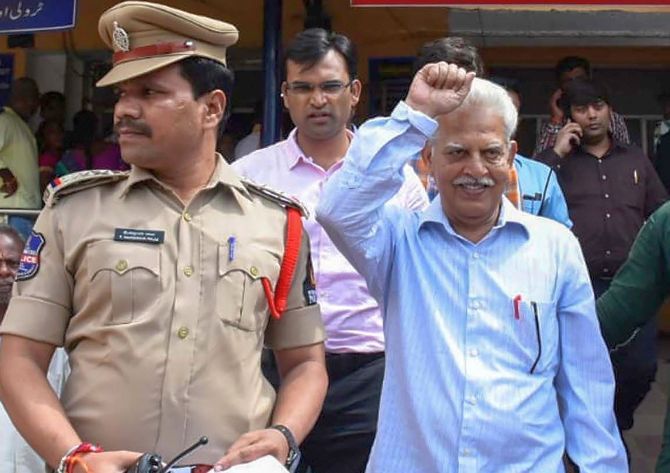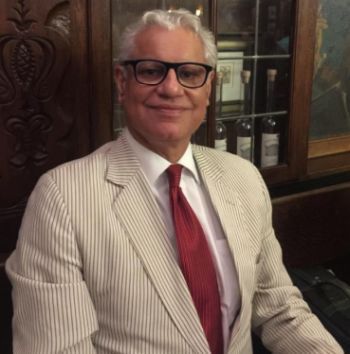'You know the factors against you and those in favour, and you use the weapons you have in accordance with the strategy you've developed.'

Senior Counsel Anand Grover, last week got regular bail on medical grounds from the Supreme Court for Telugu poet and Bhima Koregaon accused Professor Varavara Rao.
"With all these ailments, if at his age, he were to go back to Taloja jail, his situation would deteriorate," Grover tells Jyoti Punwani.
Did you expect this verdict?
Actually, right from the beginning, when we started fighting for Varavara Rao's bail in the Bombay high court, our strategy was, and it is so in most cases, to go out there to win.
So when we succeeded in getting a six-month bail in February 2021, subject to extension, we knew that we would win ultimately. Hence when the high court dismissed the permanent medical bail application in April this year, I didn't lose hope at all.
There were a lot of odds against you: The NIA's determined hostility, the reluctance of all courts to grant the Bhima Koregaon accused bail right since their arrests in 2018, even on medical grounds. What kept you going?
There were two things.
One was the odds stacked against us because of the nature of the case; it revolved around the allegation of terrorist offences. I've gone through the case papers and I realised the prosecution's case is weak. That gave us more strength.
But then we had to overcome the likely prejudice of judges because terrorist offences were involved.
And then because of our sticking to the medical bail, because of the circumstances of Varavara Rao, we were able to go into details about his health, the ailments that he suffered.
If you've read the February 2021 high court order of Justice Shinde, you'll see he has gone into meticulous detail. He accepted all the arguments on medical ailments which would have led to Varavara Rao's death had he been sent back to Taloja jail.
That's a very powerful judgment actually, one of the very few judgments where the judge has gone into detail on the arguments advanced on medical issues and then accepted them.
That gave me a lot of strength, seeing that judges are prepared to look at the actual facts dispassionately and go according to law.
You said you didn't lose hope after the high court refused him regular bail on medical grounds in April this year. So in the Supreme Court did you decide to use a different strategy?
See, any litigation is like a war. You know the factors against you and those in favour, and you use the weapons you have in accordance with the strategy you've developed.
The Bombay high court's latest judgment didn't discourage me at all because on the face of it, it was wrong. The original order that came in February 2021, had said Rao could apply for extensions of bail. But shockingly, the latest order of April 2022 said there was no such thing. So on the face of it, it was completely incorrect. That was the only hurdle as it were.
When we realised there was a completely wrong order, and then on the medical ailments, we had a strong argument, we realised we wouldn't have much of a difficulty.
Of course in the Supreme Court, the government did try to prejudice the judges, but they didn't have much of a case.

How did you counter the argument that if someone as old as Asaram Babu with all his ailments has been denied bail, so should Varavara Rao.
There was no need to. Every case is based on its own facts.
In Varavara Rao's case, Justice Shinde had, in 2021, recorded in one para the summary of all the existing ailments. Then, he also mentioned and found, that with these ailments, if he were to go back to Taloja jail, he would meet a fate of death, because Taloja jail did not have the required infrastructural facilities to address those ailments.
And then he been getting extensions for his medical bail.
Once Justice (Uday Umesh) Lalit saw the high court order where this was made as a finding, which was not challenged by the government in the Supreme Court, those findings became final.
With those underlying ailments, was the fact that after bail was granted in 2021, Varavara Rao got 4 more ailments. He had cataract in both eyes which is still there; he had umbilical hernia, which has been operated upon by Holy Family Hospital; he had a possibility of a subdural haematoma (clots in the brain); and he also had early Parkinson's Disease.
Thus, the Supreme Court came to the conclusion that it could not be said that his health had improved. With all these ailments, if at his age, he were to go back to Taloja jail, his situation would deteriorate.
So this was quite different from Asaram Bapu's case.
What's the significance of this order? Varavara Rao is only the second person to get bail among the 16 Bhima Koregaon accused.
Sudha Bharadwaj has got bail on statutory grounds, because they did not file the chargesheet in time. Varavara Rao's is on medical grounds. The two are different.
This one won't directly apply in the Bhima Koregaon case, but it will apply in other cases where prisoners are ill.
But you have to be very meticulous in your recording of facts and then mounting an attack on that basis. You can't be general about it; you have to be very specific and detailed in your arguments. We were very detailed in the Bombay high court.

This whole fight has taken almost two years. Everyone connected with the case has been very gloomy about the way it has been going. What did you experience while fighting for almost a lost cause?
I feel all litigation should be fought very seriously, with a clear understanding of the problems and the advantages, like any war.
This case taught me the same thing that I've learnt over a period of time: That you have to be thoroughly prepared and meticulous in your arguments. And don't take it easy.
For me it's a reaffirmation of my work over the last 40 years: make sure you know your case inside out, make sure that you've done all the research on facts. Get facts which are not available to you.
I'll give you an example. Even at the start, while arguing in front of Justice Shinde, we asked for the medical records. I said I'm not going to argue until I get the medical records. So the judge directed them to get the records. I could have argued without the records, and failed.
Similarly, this time in the high court, Nanavati (the Nanavati hospital in Vile Parle, north west Mumbai) simply submitted a clinical summary of two pages. I said sorry, this is not enough. I need the actual medical records where I can show what I'm saying.
So you need to get all the material for your case and do not allow them to filibuster you. You should be ready with the law, and the law says very clearly you are entitled to it. So I got those records and from those I could show that the clinical summary did not actually match up to them. And that's why the court was actually impressed.
In the Supreme Court once they realised it was done in a meticulous manner, in detail, there was no question of them saying no.
Did you find the hospitals under pressure from the prosecution?
That was not a finding, but one of our arguments, that some of the reports appear to have been changed. And the way this had been done indicated that the NIA was pressurising them. We couldn't prove it, but it was our assertion.
The other side denied it orally across the Bar, and the Bombay high court held that we were wrong.
That issue has not been gone into by the Supreme Court, but they have overturned the order of the high court.

What was the attitude of the state government, the jail authorities?
They have not been proactive in terms of helping any prisoner.
I have clients from all over India in jails. They are entitled to, and they do ring up their lawyers, with the permission of the jail authorities. But the Bhima Koregaon accused can't even talk to their family members. It's a sad state of affairs.
The way these accused have been treated by the officials of Taloja jail, there is a huge number of things wanting in that.
One thing good that came out in this case, which would help others, is that the Bombay high court has asked for a survey of the medical facilities in all the jails in the state. And it was during this case that it came to be known that Taloja jail has no allopathic doctors.
We were able to establish that the jail manual requires a certain standard of medical facilities, and nothing was available in Taloja Jail. The Taloja facility is completely zero. Therefore the court was constrained to give directions to improve things.
I don't know if that has been done.
The report on medical facilities in all jails has not yet been furnished to us.
Feature Presentation: Aslam Hunani/Rediff.com










